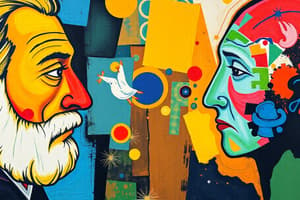Podcast
Questions and Answers
What is one criticism of Erikson's Psychosocial Stages of Development?
What is one criticism of Erikson's Psychosocial Stages of Development?
- It does not consider emotional development.
- It includes only two stages of development.
- It is too focused on the role of women in development.
- It assumes completion of one stage is necessary for the next. (correct)
Which stage in Erikson's model emphasizes the search for identity?
Which stage in Erikson's model emphasizes the search for identity?
- Adolescence (correct)
- Infancy
- Adulthood
- Old Age
What aspect does Freud's psychosexual theory primarily focus on?
What aspect does Freud's psychosexual theory primarily focus on?
- Cognitive development stages
- Moral development in children
- Facets of wants, needs, and desires (correct)
- Social roles in adulthood
How many stages are present in Freud's psychosexual theory?
How many stages are present in Freud's psychosexual theory?
What criticism is leveled against both Erikson's and Freud's developmental theories?
What criticism is leveled against both Erikson's and Freud's developmental theories?
What is the major virtue associated with the first stage of Erickson's psychosocial development?
What is the major virtue associated with the first stage of Erickson's psychosocial development?
In which stage does an individual develop a sense of independence?
In which stage does an individual develop a sense of independence?
Which stage is characterized by the development of self-confidence in abilities?
Which stage is characterized by the development of self-confidence in abilities?
What psychosocial crisis is faced during the age range of 12-18?
What psychosocial crisis is faced during the age range of 12-18?
At which stage do individuals typically establish intimacy and relationships with others?
At which stage do individuals typically establish intimacy and relationships with others?
What task is associated with the stage of Industry vs. Inferiority?
What task is associated with the stage of Industry vs. Inferiority?
Which stage involves the crisis of Generativity vs. Stagnation?
Which stage involves the crisis of Generativity vs. Stagnation?
What is the outcome if an individual is successful in overcoming the crisis of Intimacy vs. Isolation?
What is the outcome if an individual is successful in overcoming the crisis of Intimacy vs. Isolation?
What is the epigenetic principle in Erikson's theory?
What is the epigenetic principle in Erikson's theory?
What must individuals grapple with to progress through Erikson's stages?
What must individuals grapple with to progress through Erikson's stages?
Which statement accurately reflects Erikson's view on development?
Which statement accurately reflects Erikson's view on development?
What critique has been leveled at Erikson's stage theory?
What critique has been leveled at Erikson's stage theory?
How do sociocultural contexts influence Erikson's stages?
How do sociocultural contexts influence Erikson's stages?
What is suppression as defined in psychological terms?
What is suppression as defined in psychological terms?
Which statement about Erik Erikson's theory of psychosocial development is accurate?
Which statement about Erik Erikson's theory of psychosocial development is accurate?
What is the central crisis of the first stage in Erikson's psychosocial development?
What is the central crisis of the first stage in Erikson's psychosocial development?
What happens if an infant's needs are not sufficiently met according to Erikson's theory?
What happens if an infant's needs are not sufficiently met according to Erikson's theory?
Why is a certain amount of mistrust necessary in childhood development?
Why is a certain amount of mistrust necessary in childhood development?
Which defense mechanism allows an individual to channel their aggression into a constructive activity?
Which defense mechanism allows an individual to channel their aggression into a constructive activity?
Which of the following statements correctly describes Erikson's view on adulthood?
Which of the following statements correctly describes Erikson's view on adulthood?
What defines the 'Crisis' in each of Erikson's stages of development?
What defines the 'Crisis' in each of Erikson's stages of development?
What term describes the sexual energy that can manifest through different types of behaviors?
What term describes the sexual energy that can manifest through different types of behaviors?
What does Freud mean by the term 'fixation'?
What does Freud mean by the term 'fixation'?
Which part of the body does the oral stage primarily focus on for pleasure?
Which part of the body does the oral stage primarily focus on for pleasure?
What behavior might suggest an oral fixation in adulthood according to Freud?
What behavior might suggest an oral fixation in adulthood according to Freud?
During the oral stage, what may cause a child to develop negative personality traits?
During the oral stage, what may cause a child to develop negative personality traits?
Which component of the psyche is impulsive and desires immediate gratification?
Which component of the psyche is impulsive and desires immediate gratification?
How does the ego function in Freud's theory?
How does the ego function in Freud's theory?
What is the role of the superego in Freud's theory?
What is the role of the superego in Freud's theory?
What is a potential outcome for a child who is overfed or overly gratified?
What is a potential outcome for a child who is overfed or overly gratified?
Which behaviors are associated with oral fixation in adulthood?
Which behaviors are associated with oral fixation in adulthood?
During which stage does the libido become focused on the anus?
During which stage does the libido become focused on the anus?
What can unresolved conflicts during the anal stage lead to?
What can unresolved conflicts during the anal stage lead to?
What characterizes the phallic stage of development?
What characterizes the phallic stage of development?
What conflict occurs during potty training according to Freud?
What conflict occurs during potty training according to Freud?
How do children typically resolve the Oedipus complex?
How do children typically resolve the Oedipus complex?
What is a result of being fixated in the oral stage?
What is a result of being fixated in the oral stage?
Flashcards
Trust vs. Mistrust
Trust vs. Mistrust
A stage in psychosocial development where infants learn to trust or mistrust their caregivers based on how well their needs are met.
Autonomy vs. Shame
Autonomy vs. Shame
A stage in psychosocial development where toddlers learn to become independent and self-reliant, or feel shame and doubt when they fail.
Initiative vs. Guilt
Initiative vs. Guilt
A stage in psychosocial development where preschoolers learn to take initiative and explore their surroundings, or feel guilt for their actions if they are punished or criticized.
Industry vs. Inferiority
Industry vs. Inferiority
Signup and view all the flashcards
Identity vs. Role Confusion
Identity vs. Role Confusion
Signup and view all the flashcards
Intimacy vs. Isolation
Intimacy vs. Isolation
Signup and view all the flashcards
Generativity vs. Stagnation
Generativity vs. Stagnation
Signup and view all the flashcards
Ego Integrity vs. Despair
Ego Integrity vs. Despair
Signup and view all the flashcards
Erikson's Psychosocial Stages
Erikson's Psychosocial Stages
Signup and view all the flashcards
Integrity vs Despair (Erikson)
Integrity vs Despair (Erikson)
Signup and view all the flashcards
Identity vs Role Confusion (Erikson)
Identity vs Role Confusion (Erikson)
Signup and view all the flashcards
Freud's Psychosexual Stages
Freud's Psychosexual Stages
Signup and view all the flashcards
Oral Stage (Freud)
Oral Stage (Freud)
Signup and view all the flashcards
What is the Id?
What is the Id?
Signup and view all the flashcards
What is the Ego?
What is the Ego?
Signup and view all the flashcards
What is the Superego?
What is the Superego?
Signup and view all the flashcards
What is an Erogenous Zone?
What is an Erogenous Zone?
Signup and view all the flashcards
What is Fixation in Freud's theory?
What is Fixation in Freud's theory?
Signup and view all the flashcards
What is the Oral Stage?
What is the Oral Stage?
Signup and view all the flashcards
What are the consequences of Oral Fixation?
What are the consequences of Oral Fixation?
Signup and view all the flashcards
How does the Oral Stage influence personality?
How does the Oral Stage influence personality?
Signup and view all the flashcards
Anal stage
Anal stage
Signup and view all the flashcards
Anal Fixation
Anal Fixation
Signup and view all the flashcards
Phallic Stage
Phallic Stage
Signup and view all the flashcards
Oedipus Complex
Oedipus Complex
Signup and view all the flashcards
Electra Complex
Electra Complex
Signup and view all the flashcards
Identification
Identification
Signup and view all the flashcards
Oral Personality
Oral Personality
Signup and view all the flashcards
Optimistic personality
Optimistic personality
Signup and view all the flashcards
Sublimation
Sublimation
Signup and view all the flashcards
Repression
Repression
Signup and view all the flashcards
Suppression
Suppression
Signup and view all the flashcards
Erikson's Stages of Psychosocial Development
Erikson's Stages of Psychosocial Development
Signup and view all the flashcards
Autonomy vs. Shame and Doubt
Autonomy vs. Shame and Doubt
Signup and view all the flashcards
Lifelong Development
Lifelong Development
Signup and view all the flashcards
Social Influences
Social Influences
Signup and view all the flashcards
Sociocultural Context
Sociocultural Context
Signup and view all the flashcards
Vagueness in Erikson's Theory
Vagueness in Erikson's Theory
Signup and view all the flashcards
Study Notes
Erikson's Psychosocial Theory
- Erikson (1902-1994), a student of Freud, expanded Freud's theory of psychosexual development
- He emphasized the role of culture in parenting and motivations.
- Erikson identified eight stages of psychosocial development across the lifespan.
- He proposed that personality develops throughout life, unlike Freud who believed personality was fixed in early life.
- Each stage involves a conflict or task, and successful completion leads to healthy personality and competence.
Psychosocial Stages of Development
- Erikson believed the ego is more important than the id.
- Individuals make conscious choices based on social and cultural needs.
- Key motivations include feeling the world is trustworthy, being capable, making a contribution to society, and a meaningful life.
- Development happens in stages, influenced by social-cultural surroundings.
Stage 1: Trust vs. Mistrust (0-18 months)
- Infants learn to trust caregivers.
- Responsive caregivers lead to trust, while unresponsive caregivers lead to mistrust.
- Successful resolution leads to the virtue of hope.
Stage 2: Autonomy vs. Shame and Doubt (18 months-3 years)
- Toddlers develop independence and control.
- Autonomy comes from having choices, while shame and doubt stem from restrictions.
- Successful resolution leads to the virtue of will.
Stage 3: Initiative vs. Guilt (3-6 years)
- Preschoolers initiate activities and social interactions.
- Successful initiative building leads to self-confidence and purpose.
- Unsuccessful interactions lead to feelings of guilt.
Stage 4: Industry vs. Inferiority (6-12 years)
- Elementary school children compare themselves with peers.
- Successful experiences lead to pride and accomplishment.
- Failure or poor social interactions lead to feelings of inferiority.
- Competence is the virtue.
Stage 5: Identity vs. Role Confusion (12-18 years)
- Adolescents develop a sense of self.
- Exploration of roles and ideas is part of this stage.
- Successful resolution leads to a strong sense of identity, while confusion leads to difficulty establishing an identity.
- Fidelity is the virtue.
Stage 6: Intimacy vs. Isolation (19-40 years)
- Young adults seek intimate relationships.
- Successful establishment of relationships leads to love.
- Failure to establish relationships leads to isolation.
Stage 7: Generativity vs. Stagnation (40-65 years)
- Middle-aged adults contribute to the next generation.
- Generativity involves work and care for others.
- Failure to contribute leads to feeling stagnant.
- Care is the virtue.
Stage 8: Integrity vs. Despair (65+ years)
- Older adults reflect on their lives.
- Acceptance of accomplishments leads to integrity.
- Regret or dissatisfaction leads to despair.
- Wisdom is the virtue.
Critical Evaluation of Erikson's Theory
- Erikson's theory is valuable for understanding lifespan development.
- It has been criticised for being unfalsifiable and unclear about what constitutes success in each stage.
- Specific hypotheses within the theory may be supported by research.
Studying That Suits You
Use AI to generate personalized quizzes and flashcards to suit your learning preferences.




